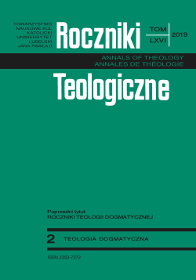Joseph Ratzingers Antwort auf die religionsgeschichtliche Relativierung des Christentums
Joseph Ratzinger's Answer on the Religious-historical Relativization of Christianity
Author(s): Karl-Heinz MenkeSubject(s): Christian Theology and Religion, Theology and Religion, Systematic Theology
Published by: Towarzystwo Naukowe KUL & Katolicki Uniwersytet Lubelski Jana Pawła II
Keywords: “Dominus Iesus”; ascendant and descendent Religion; Relativization of Christianity; personal truth; unity of truth; Joseph Ratzinger
Summary/Abstract: Joseph Ratzinger, who is author of the teaching document “Dominus Iesus”, published by Pope John Paul II at the turn of the millennium, opposes the relativisation of the Christian truth claim as it is made from the perspective of comparative religion. He distinguishes between an ascendant variation of religion (which is also called `Asian' or `related to mysticism') and a descendent variation of religion (which is also called `monotheistic' or `revelatory'). The former is determined by the relativisation of all dogmatic statements in favour of a transcendent truth, which each may interpret in their own way. The descendant variation, on the other hand, takes God, not man as a starting point. It is − whether in the form of Judaism, Christianity or Islam – monotheistic. For it is based on the personal self-revelation of the one and only Creator in the finitude of space and time. Whereas Judaism identifies the one and only truth of God with the history experienced and remembered by the people of Israel, Islam identifies the only truth of God with a book, the Qu'ran, as it is very much in contrast to Christianity where the person of Jesus Christ is considered the only truth of God. According to Joseph Ratzinger it makes a huge difference whether a person or a book is regarded to be the self-revelation of the absolute, i.e. God. This is because a person is not an object. The only logic that does justice to a person is the dia-logic, i.e. inter-communication or inter-action. A Christianity which remains faithful to its origin and to its true nature can never, as the emeritus Pope emphasizes by distancing himself from the Heidelberg Egyptologist Jan Asmann, commit any kind of violence against dissenters. Because the God whom Christians testify is none other than the man who said of himself, “He who has seen me has seen the Father.” (Joh 14.9) He is none other but the Redeemer, who allows Himself to be crucified rather than imposing something through violence, and may it objectively be the best which could be wished for.
Journal: Roczniki Teologiczne
- Issue Year: 66/2019
- Issue No: 2
- Page Range: 35-52
- Page Count: 18
- Language: German

